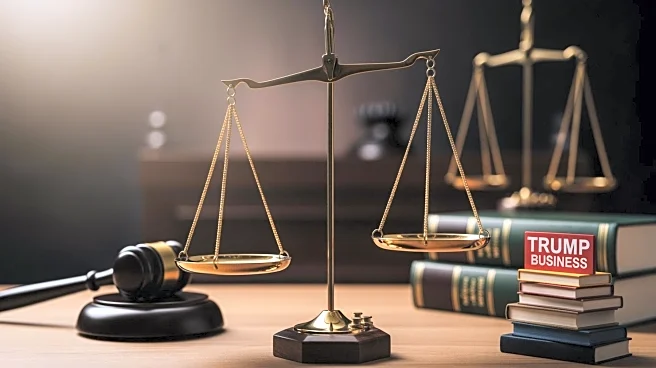What's Happening?
The Supreme Court has agreed to extend the time allocated for oral arguments in cases challenging President Trump's tariffs, scheduled for November 5. These cases involve the president's use of the International Emergency Economic Powers Act (IEEPA) and
the Trade Act of 1974 to impose tariffs. The extension allows 40 minutes for the solicitor general and 20 minutes for each advocate representing private and state parties. The cases, Learning Resources, Inc., ET AL. V. Trump, President of U.S., ET AL., and Trump, President of U.S., ET AL. V. V.O.S. Selections, Inc., ET AL., were expedited due to claims from small businesses and states that the tariffs have been imposed illegally, causing economic strain.
Why It's Important?
The Supreme Court's decision to extend oral argument time highlights the significance of the legal challenges against President Trump's tariffs. These tariffs, imposed under emergency powers, have been contested by small businesses and states, arguing they were enacted unlawfully. The outcome of these cases could have substantial implications for U.S. trade policy and the president's authority to regulate imports during national emergencies. A ruling in favor of the administration could reinforce the president's power to use tariffs as a tool for economic policy, while a decision against could limit such executive actions, impacting businesses reliant on international trade.
What's Next?
The Supreme Court is set to hear the cases on November 5, with a potential decision expected by the end of the year. The aggressive timeline suggests a swift resolution, which could influence future presidential use of emergency powers in economic policy. Stakeholders, including small businesses and state governments, are closely monitoring the proceedings, as the court's ruling will determine the legality of the tariffs and potentially reshape the balance of power between the executive branch and trade regulation.
Beyond the Headlines
The legal challenges against President Trump's tariffs raise broader questions about the scope of presidential powers under emergency conditions. The cases could set a precedent for how future administrations utilize emergency powers in economic policy, potentially affecting international trade relations and domestic economic stability. The Supreme Court's decision will be pivotal in defining the limits of executive authority in trade matters.















